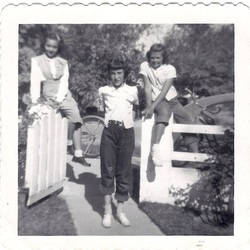
Deryle Ann’s friend, Betty Lou Anderson, lived in a big house on top of a hill. Her father was in construction, and her parents had built their house themselves. Betty Lou’s mom didn’t wear makeup, not even lipstick. With her wire-rimmed glasses like my grandmother’s, she looked like a pioneer woman in blue jeans and moccasins. Her pantry was stocked with hundreds of jars of fruits and vegetables. “For the end of the world,” she told me, adding that they were just for Mormons; even if I were starving I couldn’t have any unless I converted. I didn’t say it, but I thought I’d rather starve. Betty Lou was one of those girls who seem to know everything, especially about sex. In fifth grade, she told Deryle Ann and me that to get a baby you had to let a man put his thing in you, which hurt so bad most women couldn’t stand it more than a minute or two. “It’s twenty minutes for twins,” she said with a solemn, know-it-all face. Even worse, she told us that her twelve year old cousin was getting married as soon as she got her period to a sixty year old man who already had fifteen wives. I almost puked over that one!
In a way, North Ninth Street was similar to Bonneville Ave. We were hardly rich, but compared to most of our neighbors we were rolling in dough. The first year we lived there, mother threw a birthday party for me and hired a woman in a maid’s uniform to help. Mother even had a grab bag full of games for kids who didn’t win a prize at Pin-the-tail-on-the-Donkey. My birthday party was talked about for years. Which was fine in second grade, when Mrs. Fife told the class I had the highest score on the second/third grade achievement test, and in third grade when I was the teacher’s pet. But in fourth grade, I had Mrs. Olive. She hated me. And the more she hated me, the more my classmates followed suit, even Deryle Ann. They had all resented me since the birthday party, and this was their chance to show it. My mother tried to make things better. She had a little talk with Mrs. Olive. It seems Mrs. Olive wanted me to wear jeans like the other kids instead of fancy dresses from a children’s store in Hollywood. My mother said she didn’t pay good money for my clothes so they could rot in the closet. Then, to make matters worse, she asked why my grades had fallen when I was one of the brightest children at North Ninth St. School? I was screwed! Mrs. Olive would ask me to tell the class what grade I had received on the history test. “C,” I’d say, and she’d say, “And your mother thinks you’re bright.” She took to throwing erasers at me when I wasn’t paying attention, which was often. She would stand over me when I was taking a exam, so close I could feel her hot breath on my neck. I vowed to myself that I would buy a gun and shoot her through the head when I grew up.
 RSS Feed
RSS Feed